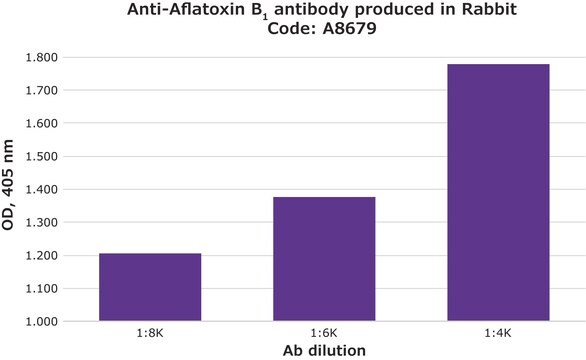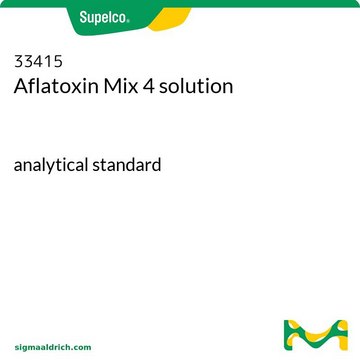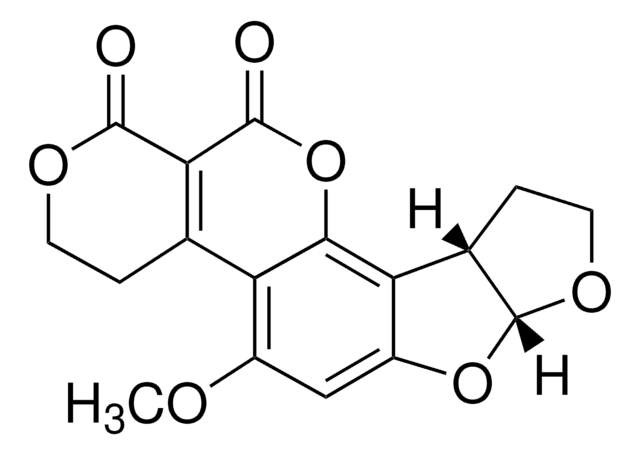A9555
Monoclonal Anti-Aflatoxin B1 (G1, Q1, B2, G2) antibody produced in mouse
clone AT-B1, ascites fluid
Se connecterpour consulter vos tarifs contractuels et ceux de votre entreprise/organisme
About This Item
Produits recommandés
Source biologique
mouse
Niveau de qualité
Conjugué
unconjugated
Forme d'anticorps
ascites fluid
Type de produit anticorps
primary antibodies
Clone
AT-B1, monoclonal
Contient
15 mM sodium azide
Technique(s)
ELISA: 1:20,000 using aflatoxin B1-BSA
Isotype
IgG1
Conditions d'expédition
dry ice
Température de stockage
−20°C
Modification post-traductionnelle de la cible
unmodified
Description générale
Monoclonal anti-Aflatoxin B (mouse IgG1 isotype) is 1 derived from the hybridoma produced by the fusion of mouse myeloma cells and splenocytes from an immunized mouse.Aflatoxins are a group of naturally occurring fungal toxins (mycotoxins) synthesized by Aspergillus flavus and Aspergillus parasiticus. It is found as contaminants in human and animal food such as corn, peanuts, tree nuts, cottonseed, cereal crops, beans, casssava, milo, sorghum, copra, rice, dried fish and beer.
Immunogène
aflatoxin B -KLH conjugate
Application
Monoclonal Anti-Aflatoxin B1 (G1, Q1, B2, G2) antibody produced in mouse has been used in indirect enzyme linked immunosorbent assay (ELISA) and fluorescence polarization assay.
Actions biochimiques/physiologiques
Aflatoxin B (AFB) and its metabolites is known to act as potent carcinogens, mutagens and teratogens, in addition to its toxicity. Aflatoxins have been implicated in human hepatocellular carcinoma, outbreaks of aflatoxicosis, Rey′s syndrome, chronic hepatitis and increased mortality from infection in animal husbandry.
Description de la cible
Mycotoxins, a group of chemically diverse secondary fungal metabolites, induce a variety of toxic responses in humans and animals when food and feed containing these compounds are ingested. Rapidly quantitating levels of mycotoxin contamination can help reduce exposure to these toxins.
Clause de non-responsabilité
Unless otherwise stated in our catalog or other company documentation accompanying the product(s), our products are intended for research use only and are not to be used for any other purpose, which includes but is not limited to, unauthorized commercial uses, in vitro diagnostic uses, ex vivo or in vivo therapeutic uses or any type of consumption or application to humans or animals.
Vous ne trouvez pas le bon produit ?
Essayez notre Outil de sélection de produits.
Code de la classe de stockage
10 - Combustible liquids
Classe de danger pour l'eau (WGK)
WGK 3
Point d'éclair (°F)
Not applicable
Point d'éclair (°C)
Not applicable
Faites votre choix parmi les versions les plus récentes :
Déjà en possession de ce produit ?
Retrouvez la documentation relative aux produits que vous avez récemment achetés dans la Bibliothèque de documents.
Les clients ont également consulté
Development of a fluorescence polarization assay for the determination of aflatoxins in grains
Nasir MS and Jolley ME
Journal of Agricultural and Food Chemistry, 50(11), 3116-3121 (2002)
Mycotoxins
Bennett JW, et al.
Clinical Microbiology Reviews, 16(3), 497-497 (2003)
Physicochemical and immunological characterization of chitosan-coated bacteriophage nanoparticles for in vivo mycotoxin modeling
de Andrade CYT, et al.
Carbohydrate Polymers, 185, 63-72 (2018)
Robert J Lee et al.
Scientific reports, 6, 33221-33221 (2016-09-15)
Aflatoxins are mycotoxins secreted by Aspergillus flavus, which can colonize the respiratory tract and cause fungal rhinosinusitis or bronchopulmonary aspergillosis. A. flavus is the second leading cause of invasive aspergillosis worldwide. Because many respiratory pathogens secrete toxins to impair mucociliary
Screening of Lactobacillus casei strains for their ability to bind aflatoxin B1
Hernandez MA, et al.
Food And Chemical Toxicology, 47(6), 1064-1068 (2009)
Notre équipe de scientifiques dispose d'une expérience dans tous les secteurs de la recherche, notamment en sciences de la vie, science des matériaux, synthèse chimique, chromatographie, analyse et dans de nombreux autres domaines..
Contacter notre Service technique









